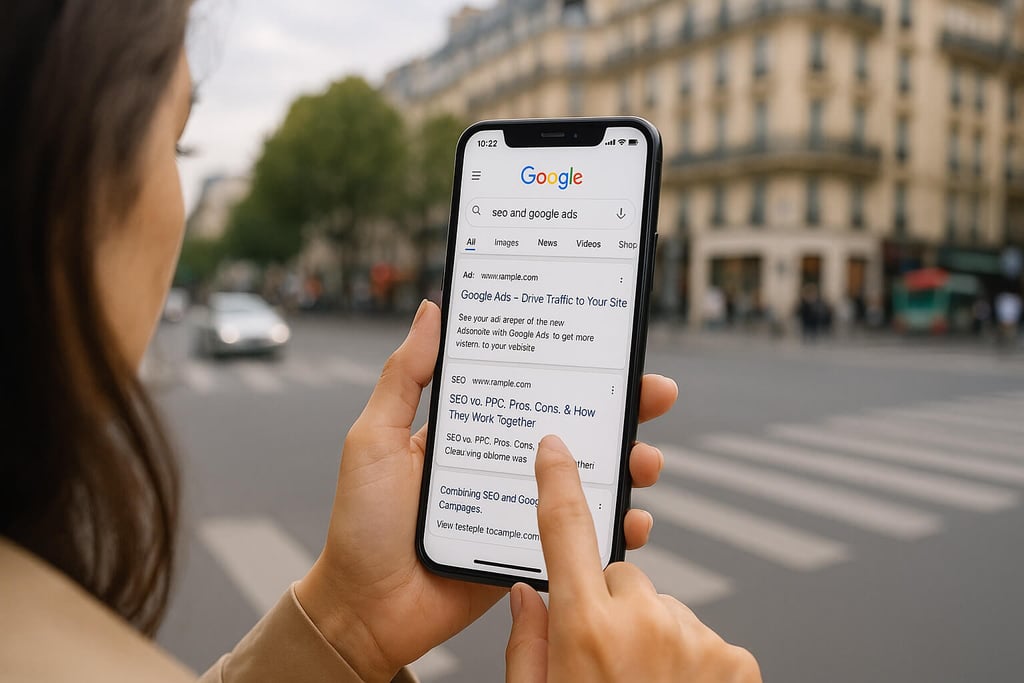SEOJet Flight Blog
Use SEO and Google Ads Together for Paid Search Success
Use SEO and Google Ads together for paid search success. Boost your ranking and conversion by combining SEO and Google Ads. Get SEO best practices!
SEO FOR UK BUSINESSES
Ardene Stoneman
5/15/20256 min read


How to Use Google Ads and SEO Together for Better Search Performance
Combining SEO and Google Ads is a smart approach if you're looking to maximise your visibility across search engine results pages.
While SEO builds long-term organic performance, Google Ads gives you instant placement at the top of the page.
In this article, we’ll explore how SEO and Google Ads can work together effectively, what each method contributes, and how to plan a strategy that blends paid and organic search to improve your traffic and conversions.
Article Outline
What’s the Difference Between SEO and Google Ads?
Why Use Google Ads If You’re Investing in SEO?
Can Google Ads Improve Your SEO Ranking?
Is Paid Search Worth It for Organic Businesses?
How Do Google Ads and SEO Work Together?
What Role Does Keyword Research Play in Both?
How Do You Track SEO and Google Ads Performance?
Should You Optimise the Same Landing Page for Both?
What Can You Learn from Google Ads for SEO Content?
When Is It Best to Start Using Both SEO and Google Ads?
How Can Analytics Help Improve SEO and PPC?
What Are the Benefits of SEO Compared to PPC?
Should You Prioritise Organic or Paid Traffic First?
What Happens When You Stop a Google Ads Campaign?
How to Build a Strategy That Combines SEO and Google Ads
1. What’s the Difference Between SEO and Google Ads?
Search engine optimisation (SEO) focuses on improving visibility in the organic search results. Google Ads, on the other hand, is a form of paid search where you pay to have your ad appear at the top of the results.
SEO involves long-term work: creating quality seo content, improving technical seo, and building backlinks. Results aren’t instant. SEO takes time.
Google Ads delivers quicker traffic but at a cost per click. With Google Ads, your ads appear at the top when users search for terms you’ve bid on.
Both approaches target the same audience but through different mechanisms. SEO earns visibility. Google Ads buys it.
2. Why Use Google Ads If You’re Investing in SEO?
Even if your SEO campaigns are doing well, there are good reasons to use Google Ads:
You can appear above the organic results, increasing your chances to get the click.
It gives immediate data on which keyword terms convert well.
You can test different landing page designs quickly without risking your SEO rankings.
Running a google ads campaign allows you to test ideas at speed. For example, you can try new ad copy, pricing structures or calls to action and see what drives conversion rates before updating organic pages.
3. Can Google Ads Improve Your SEO Ranking?
Running paid ads does not directly improve your organic search rankings. The Google algorithm separates paid and organic results. However, there are indirect effects:
Paid ads drive traffic to your site. More visitors can mean more engagement and shares.
You can gather data through google analytics and adapt your seo strategies based on real user behaviour.
While Google won’t reward you directly for spending, using both strategies can help identify what works faster, leading to smarter SEO decisions.
4. Is Paid Search Worth It for Organic Businesses?
Yes - if used properly. Paid search gives you immediate visibility while SEO builds. If your seo success is limited by a competitive niche or long indexing times, Google Ads can give your site momentum.
Consider:
Ads appear at the top - often above even high-ranking organic listings.
You only pay when users click.
You can pause or adjust campaigns at any time.
For product launches, time-limited promotions, or testing new markets, paid ads make a lot of sense, even for SEO-focused businesses.
5. How Do Google Ads and SEO Work Together?
Using both seo and google ads together allows you to cover more ground in the search engine results pages. You’re not just relying on one spot. You can:
Own both paid and organic positions for the same keyword.
Control messaging with paid ad copy and match it with optimised seo content.
Retarget users who’ve clicked on organic listings with display ads.
Combining seo and google ads means your visibility increases, your message is consistent, and you collect data that benefits both campaigns.
6. What Role Does Keyword Research Play in Both?
Keyword research sits at the core of both strategies. Without it, your google ads won’t target the right audience, and your seo won’t rank for what matters.
In Google Ads:
You select exact match, phrase match or broad match keywords.
You adjust bids based on performance.
In SEO:
You map keywords to pages based on intent.
You optimise content, titles, and meta descriptions.
Good keyword research saves money in paid search and increases organic traffic. It’s worth doing properly at the start of both.
7. How Do You Track SEO and Google Ads Performance?
Use google analytics to track both channels. Set up conversion tracking, attribution models and goals. Measure not just visits, but what those visitors do.
For SEO:
Track rankings for target keywords.
Monitor organic traffic and bounce rate.
For Google Ads:
Track click-through rate (CTR), cost per click, and conversions.
Use the search terms report to refine targeting.
Analytics helps you avoid duplication, see gaps in coverage, and find out which channels perform best.
8. Should You Optimise the Same Landing Page for Both?
This depends on your strategy. A landing page for google ads is often designed for immediate action. SEO pages may focus on deeper content and longer dwell time.
You can:
Use one page if you can balance quality content with strong calls to action.
Or split traffic: one page for seo and another dedicated to paid traffic.
Use A/B testing to compare performance. What works in a google ads campaign doesn’t always work for organic search, and vice versa.
9. What Can You Learn from Google Ads for SEO Content?
Google Ads offers fast feedback. If a keyword gets clicks but low conversion, that insight is useful. You might:
Adjust your meta description to improve organic click-through.
Rewrite your content to match better with the user intent.
Ad copy can reveal what users respond to. That can feed back into page titles, content intros, and calls to action for organic pages.
10. When Is It Best to Start Using Both SEO and Google Ads?
Start both early, but be realistic about expectations.
Google Ads gives you immediate feedback, great for new sites with no rankings.
SEO is an investment - the earlier you start, the sooner it builds momentum.
Launching both together helps you build awareness quickly, test your value proposition, and set a long-term foundation through seo content and technical seo best practices.
11. How Can Analytics Help Improve SEO and PPC?
Analytics reveals how users behave. By comparing paid and organic users, you can:
Spot keywords with strong performance across both.
Identify drop-off points on landing pages.
Adjust your ad copy or content based on actual engagement.
You can also track assisted conversions - for example, users who found you through organic search but later clicked a paid ad to return.
12. What Are the Benefits of SEO Compared to PPC?
Let’s be blunt: SEO is slower, but cheaper long term.
Benefits of SEO:
Organic traffic doesn’t stop when the budget runs out.
Search engine results pages give credibility to organic results.
Good content improves over time and attracts backlinks.
Limitations of PPC:
You pay for every click.
Ads stop appearing when the budget ends.
Cost per click can rise in competitive industries.
That said, combining both helps you cover all angles.
13. Should You Prioritise Organic or Paid Traffic First?
That depends on your budget and timeline. If you need leads tomorrow, use google ads. If you’re planning 6-12 months ahead, focus on building your SEO foundation.
For most businesses, using both seo and google ads together is more efficient than choosing one. Start with paid to gain traction, then reduce spend as organic search results take over.
14. What Happens When You Stop a Google Ads Campaign?
When you stop your google ads campaign:
Your paid visibility disappears overnight.
Organic traffic remains steady (if your SEO is solid).
This is why SEO efforts matter. Relying only on paid ads means no fallback. Businesses that pause ads and still see traffic to your website are usually the ones who invested early in SEO.
Think of Google Ads as the accelerator, and SEO as the engine.
15. How to Build a Strategy That Combines SEO and Google Ads
Start with your business goals. Then:
Do thorough keyword research.
Create landing pages that serve both SEO and paid ads.
Write ad copy and SEO content aligned with user intent.
Use analytics to refine performance.
Test, measure, and adjust.
Using both seo and paid search together lets you spot quick wins and long-term opportunities. It’s not one or the other. It’s a matter of timing, budget, and objectives.
Summary: Key Points to Remember
Google Ads delivers fast results, SEO builds long-term growth.
Use keyword research to guide both SEO content and paid ads.
Combine organic and paid search for maximum visibility.
Track everything through Google Analytics and refine often.
Build pages that work for both landing page conversions and SEO performance.
Let insights from paid ad copy influence organic content strategies.
Balance spend by shifting from PPC to SEO as rankings improve.
A strong SEO strategy gives stability when google ads campaign budgets pause.
Smart businesses use seo and ppc to complement each other, not compete.
Plan based on your needs, not just trends - align with real strategy for your business.
If you want help integrating Google Ads into your SEO strategy - or building an SEO plan that brings lasting traffic - SEOJet can help.
With years of hands-on experience running both sides of the search engine equation, we know how to make your site visible, profitable, and futureproof.
Get in touch for practical advice that works.
Services
Contact Us
Newsletter Signup
sales@seojet.co.uk
01934 289 404
© 2025. All rights reserved.


Locations
Weston-super-Mare
Somerset
Bristol
9am - 6pm, Monday to Friday
Suite 2, Unit 7, 12 Beaufigter Rd, Weston-super-Mare, BS24 8EE
